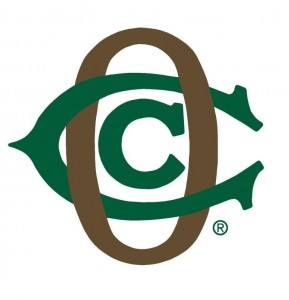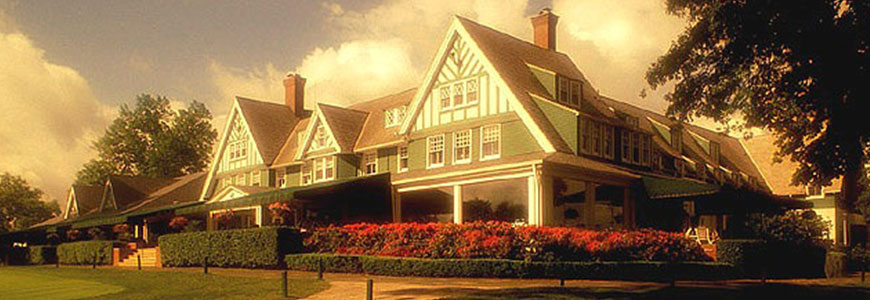 About The Club: Introduced in 1903 by designer Henry Fownes, Oakmont Country Club has hosted more combined USGA and PGA championships than any other course in the U.S., including eight United States Opens, five U.S. Amateurs, three PGA Championships, and two U.S. Women’s Opens. Oakmont remains perhaps the most difficult course in North America, with 210 deep bunkers (personified by the Church Pews), hard and slick greens that slope away from the player, and tight fairways requiring the utmost precision. Golf Digest ranks Oakmont #5 in its most recent version of America’s Top 100 courses.
About The Club: Introduced in 1903 by designer Henry Fownes, Oakmont Country Club has hosted more combined USGA and PGA championships than any other course in the U.S., including eight United States Opens, five U.S. Amateurs, three PGA Championships, and two U.S. Women’s Opens. Oakmont remains perhaps the most difficult course in North America, with 210 deep bunkers (personified by the Church Pews), hard and slick greens that slope away from the player, and tight fairways requiring the utmost precision. Golf Digest ranks Oakmont #5 in its most recent version of America’s Top 100 courses.
History: The story of Oakmont Country Club is the story of Henry Clay Fownes, and his equally intelligent, resourceful and willful son, William Clark Fownes Jr. (named after an uncle). H.C., the son of English immigrants, had to leave school at age 15 to work in the family’s iron business in Pittsburgh. Before long, he was running it, and built it into a small empire. H.C. was 21 when W.C. Jr. was born. The family business offered an insight into the character of H.C. Patriarchal even among his brothers, he retained a controlling interest in all the family business ventures. He called the shots.
What H.C. had intended to be a sturdy and worthy test for him turned out to be one of the great golf courses in the world. Many called it the fiercest course of all. And few if any courses, have had the praises and curses sung as Oakmont has over the years. Ron Whitten, noted golf course architecture writer, said Oakmont would be “front and center” if there were a Mount Rushmore of great courses. H.C. was president of Oakmont from its founding, in 1903, until his death in 1935, and W.C. was president from then till his resignation in 1946. Oddly enough, the authoritative father-son combination sowed the seeds of discontent at Oakmont. They envisioned a golf club, much like the celebrated courses of Britain. But American clubs, family-oriented, needed a variety of pastimes and social events in order to attract members, the financial life blood of any club. The Fownses granted some things, but drew the line at a swimming pool. He realized the pool was necessary for the good of the club, but he refused to be part of it. He resigned in 1946. He died in 1950, and the pool was installed in 1954.
The Position: The position requires a personable, well-organized leader who is committed to being the best in their field. The Executive Chef is hands-on and cooks or directly supervises the cooking of items that require skillful preparation. Evaluates food products to assure that quality standards are consistently achieved and develops policies and procedures to enhance and measure quality. The Executive Chef also oversees the Employee Meal Program.
It will be important that the new professional align him or herself with, and embrace, the Club’s golf culture, forging partner relationships with the membership, management and line personnel, all built on honesty, respect and dedication. The EC will always look for improvement while continuing to maintain the high standards of excellence already instilled into the kitchen operation. The ideal candidate will possess a true passion for professional cooking and have a proven stable track record of culinary excellence at recognized properties.
The Executive Chef is responsible for the creation of and adherence to operating budgets which includes sales, food labor and overhead costs. He or she is in charge of hiring, training and other personnel related matters of the culinary staff needed to execute the culinary operation successfully on a year-round basis.
Job Requirements:
- Requires an organized Chef who is able to plan and execute the culinary requirements for a major golf tournament such as the U.S. Open.
- An engaging, extroverted personality – one that both staff and membership can relate to and rally around.
- The ability to lead, motivate and mentor aspiring individuals throughout the organization.
- Excellent written and verbal skills for effective communication.
- Competent in organizational, time management skills. The ability to demonstrate good judgment, problem solving, and decision-making skills.
- Proficient in the use of technology, i.e., Microsoft Office, Outlook etc.
- Knowledge of wine and beverage pairing with food.
- Able to work in a team environment and relate well to other department heads and membership.
- Sets the example for professionalism when working and communicating with the service and catering staff.
- Develops recipes and techniques for food preparation and presentation which help to assure a consistently high quality product.
- Works to minimize food costs exercising portion control over all items served. Assists in establishing menu selling prices.
Primary Responsibilities: The Executive Chef runs the kitchen as he/she selects, administers, and develops all employees under his/her supervision consistent with Club philosophy and standards. The Executive Chef evaluates job performance of culinary staff; coaches and counsels to insure staff is on right track and rewards and disciplines staff in a fair and appropriate manner. The Chef will recommend compensation rates and/or increases for culinary staff. Provides training and professional development opportunities for all culinary staff on an ongoing basis. He/she will coordinate the work of chefs, cooks, and other kitchen employees to ensure that food preparation is consistent with established standards in an efficient manner and completed within the constraints of the operating budget.
Key Expectations and Goals:
- The ability to organize and develop systems to ensure a smooth food service operation.
- Ensures that high standards of sanitation, cleanliness, and safety are maintained throughout all kitchen areas at all times. This includes daily site visits to all outlets.
- Cooks or directly supervises the cooking of items that require skillful preparation.
- The Executive Chef evaluates job performance of culinary staff; coaches and counsels to insure staff is on track. Rewards and disciplines staff in a fair and appropriate manner.
- Attends food and beverage and executive management meetings.
- Interacts enthusiastically with, and is visible to, the membership.
Dining Facilities:
- Ballroom – Elegant, Seats up to 275. Average 20 Weddings annually.
- Grill Room – casual, fast-pace dining room that serves breakfast, lunch and dinner 11 months. 7 days in season and 5 out of season. 150 seats.
- 18 Porch – 80 seats and operates April – October 7 days per week.
- # 9 Stand – Snack Bar serving April – October seven days per week. The Club averages 21,000 rounds annually.
- Pool Snack Bar – Casual seats 30 inside and 75 outside, lunch and dinner Memorial Day to Labor Day.
- Private Member & Club Events – The Club offers various size banquet rooms on property as booked.
Additional Information:
- Total annual food sales at $2.2MM; total F&B Sales $3.4MM. In 2015 the Club generated a F&B profit of $197,000.
- The desired Food cost is 40% with a sales mix of 54% a la carte and 46% banquet.
- There are 25 culinary employees, supported by a $675,000 labor budget. Also 8 stewrding staff with a $130,000 annual budget.
- The Club supports three (3) kitchens: one main kitchen, banquet and Pool Grill kitchen.
- The Executive Chef is supported by a Sous Chef and Banquet Chef. The EC does the purchasing.
- The Club hosts 22 Monday Golf Outings Annually.
- There are 16 overnite Rooms that are booked by members for their guests.
- The Executive Chef reports to the General Manager and works with Assistant General Manager, Food & Beverage Director, Catering Director and Banquet Captains.
- Must be a team player who leads by example.
- The previous chef was with the Club for 17 years.
Summary: The Club prefers a (CEC) Certified Executive Chef. The successful candidate must demonstrate values, conduct, and integrity consistent with the caring philosophy in place. The candidate must approach the position with humility and care. This individual should value the formation of lasting professional relationships and become an active member of the Management team.
The Club offers a competitive compensation plan including a competitive base salary based on experience and skill, ACF dues and Convention, dining allowance, dental, health & life insurance, 401k and other standard perks, consistent with club practices. Interested individuals should send resumes, a well-conceived cover letter, and supporting information (A Personal Portfolio is encouraged) in strict confidence. Click Here to upload your information.


